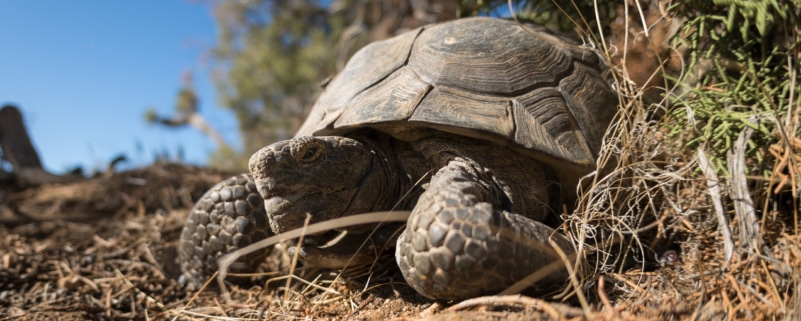Doing Our Part to Keep Them Here: Small Steps to Support Species of Concern
At the end of 2023, 21 species were removed from the United States Endangered Species Act (ESA) list, officially denoting them as extinct. Species loss has a serious and widespread impact on biodiversity, from a reduction in vital ecosystem services like pollination to disruptions in the food chain.
Because of the crucial importance of sustaining species threatened with extinction, countries across the globe have implemented anti-poaching laws, cooperative plans between agencies and financial assistance for conservation efforts. Initiatives like the ESA and the Convention on International Trade in Endangered Species have enacted policies to protect species of concern, with species like the giant panda and humpback whale exemplifying the success of these large-scale efforts.
But international collaborations and legislation are not the only ways to protect endangered species. Even at a local level, corporate landowners can meet the needs of these species and help them thrive for many years to come. In this blog, we’ll explore simple actions corporations can take to support their nearby species of concern.
Provide food and shelter with native plants
Native plants provide numerous benefits for the environment — they reduce air pollution, require less water than ornamental species and beautify locations. In addition to these benefits, they also serve as food and shelter for many endangered species. For example, pollinators at risk of extinction depend on native flowering plants for food, while small mammals like the Vancouver Island marmot find shelter in native grasses and sedges.
Corporate sites can help species of concern by determining the food and nesting needs of endangered species in their area and propagating or installing native plants that fulfill those needs. Even a small pollinator garden at an industrial park or a rain garden at a manufacturing site can provide crucial resources for endangered species.
Control invasive species
Invasive species are plants or animals that have been introduced into an area where they are not native. As they have no natural predators or controls, invasive species tend to proliferate quickly, taking resources away from native species. For species of concern, invasives pose a threat by competing for already limited resources, with 42% of endangered species at risk of extinction due to invasive species. For example, garlic mustard is an invasive plant species throughout much of the United States and Canada, and its soil-altering properties and vast seed production means it pushes out the endangered American ginseng.
By managing invasive flora and fauna, corporate sites can help the native ones prosper. Developing and adhering to a monitoring plan can alert a corporate landowner to the presence of an invasive species, and further steps like trapping, relocating or mowing the invasive species contribute to the health of endangered species.
Stop using herbicides and pesticides
While many large landholders opt to control unwanted (or even invasive) plant species and insects through the use of herbicides and pesticides, these substances bioaccumulate in organisms throughout the ecosystem, including species already at risk of extinction. This means that as an herbicide or pesticide moves through the food chain, its negative effects can build up and harm many of the species the chemical comes into contact with.
The bald eagle is perhaps the most well-known example of the impact of pesticides. Due to its widespread use, the pesticide DDT contaminated waterways and the fish inhabiting them. Bald eagles then preyed on the impacted fish, ingesting the pesticide and producing brittle eggshells that did not allow for successful hatching. Thanks to legislation banning DDT, bald eagle populations have seen a resurgence in recent decades, and the species is no longer listed as endangered.
The same solution that helped revive bald eagle populations applies to corporate sites as well — discontinuing the use of pesticides and herbicides. Implementing an herbicide- and pesticide-free policy supports the health of endangered species and the ecosystem as a whole. Integrated vegetation management techniques, such as hand-pulling, prescribed burns and the use of mulch and compost, can help companies control unwanted weeds without the use of chemicals.
Make roadways safer
It is estimated that 1 to 2 million collisions between vehicles and large wildlife occur annually in the United States. In an area where species of concern are located — especially if it is adjacent to a busy industrial site — vehicle collisions only add to the environmental risks these species face. From endangered mammals like the Iberian lynx to reptiles like the desert tortoise, vehicle collisions are among the largest threats to the species.
By installing signage to warn motorists and installing fences that prevent wildlife from accessing roads, companies can prevent dangerous collisions — for both wildlife and humans. Simple actions, like placing watering devices and planting food sources in less busy areas, can help deter wildlife from roadways.
Spread the word
Because they are a tangible reminder of the threat of species loss, species of concern often capture the attention of the general public. Connecting an animal’s face — whether that’s charismatic megafauna like the elephant or a small endangered insect like the dinosaur ant — to the potentially nebulous concept of biodiversity loss helps individuals better understand what is at risk and encourages them to get involved.
Corporate action to support a local species of concern can serve as a foundation for building community education and awareness. By sharing steps both large and small that corporations are taking to protect endangered species, community members can feel emboldened to take part in these activities as well, expanding the protection of species of concern beyond the corporate fence line. Events like school visits and citizen science activities involve a broader range of stakeholders and demonstrate how even small actions make a difference for species of concern.
Preventing the extinction of species doesn’t just rely on widescale initiatives, legislation and expensive marketing campaigns — corporate landowners can have a powerful impact by taking simple steps to protect local species of concern.
